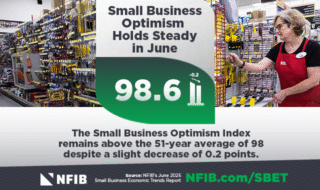May 5, 2022
Update: Victories for Small Businesses in Major Court Decisions
Across the nation, the NFIB Small Business Legal Center is involved in dozens of court cases concerning the rights of small business. In April, the U.S. Supreme Court decided two significant cases in small business’ favor. NFIB had previously filed?amicus briefs in both cases.
Boechler, P.C. v. Commissioner of Internal Revenue
?
On April 21, 2022, a unanimous U.S. Supreme Court decision stopped the U.S. Tax Court from refusing to hear a taxpayer’s challenge to an IRS assessment. The Supreme Court agreed with the amicus brief filed by NFIB in November 2021.
The case focused on the time period during which individuals can file petitions with the Tax Court to review decisions and determinations from the Internal Revenue Service (IRS). NFIB argued, and the court agreed, that the 30-day deadline to file a petition in the Tax Court for review of an IRS collection assessment is not an ironclad deadline if injury from the IRS decision was discovered after the 30-day window. This means that the Tax Court should function like any other court and allow its judges the discretion to extend deadlines in certain cases. The Supreme Court’s ruling ensures that taxpayers and small business owners have ample time for their day in court.
“We are pleased with today’s decision from the Supreme Court,” said Karen Harned, Executive Director of NFIB’s Small Business Legal Center. “Small business owners often handle their own accounting and are left to figure out for themselves the various and confusing tax rules and regulations that impact their business. We are glad the Supreme Court agreed that small business owners should not be penalized with costly and unreasonable fines when they are working hard to comply with the tax laws that apply to them.”
Cummings v. Premier Rehab Keller, P.L.L.C.
?
On April 28, in a 6-3 majority, the U.S. Supreme Court ruled that petitioners cannot recover emotional distress damages for violations of Title VI of the Civil Rights Act and other statutes.?NFIB previously filed an amicus brief in the case seeking to limit employer liability and prevent emotional distress damages under these statutes.
The case concerned whether, under these statutes, victims of discrimination can recover emotional distress damages. “Today’s decision is good news for small businesses,” said Harned in a statement. “Had the Court agreed with the petitioner’s theory, small businesses throughout the country would have unknowingly faced liability for emotional distress and be subject to the types of damages that would put a small business out of business.”
The NFIB Small Business Legal Center protects the rights of small business owners in the nation’s courts. NFIB is currently active in more than 40 cases in federal and state courts across the country and in the U.S. Supreme Court.?
NFIB is a member-driven organization advocating on behalf of small and independent businesses nationwide.
Related Articles














